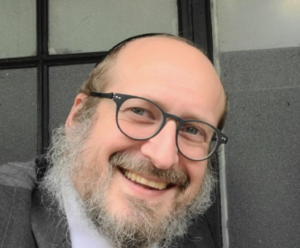Our interview with the leader of Rabbis working in Islamic countries: “Zelensky, an inspiring story”
“I wouldn’t call him a ‘modern Maccabee’, as some have written, because I don’t think it’s something that really defines him or that he likes to identify with. However, it is exciting that Jewish figures can rise to the role of leaders today, gaining prominence even in countries where life has often been troubled in the past. Zelensky’s is an inspiring and heart-warming story in the great drama of these weeks”.
Rabbi Menachem Mendel Chitrik, the city’s Ashkenazi chief rabbi and leader of the Alliance of Rabbis in Islamic Countries, answered from Istanbul. A network created in 2019, on the eve of major upheavals in the Middle East region, with the aim of providing support for every possible need (starting with Casherut and other basic religious services). A declared objective: to consolidate and strengthen a Jewish presence as much as possible, going beyond the Mediterranean basin, which has been positively “contaminated” by millennia of presence. From Alexandria to Dubai, from Casablanca to Baku, the network is extensive. And in action, the rabbi explained to Pagine Ebraiche, are “not only with the fine words of dialogue, which do not always bring results, but through concrete experience”.
Dialogue is one of the key words these days. It is precisely Turkey, together with Israel, that has put itself forward as a candidate for a mediating role in the conflict between the Russians and the Ukrainians. An initial (unsuccessful) meeting was held in Antalya. Still in the background is the hypothesis, strongly advocated by Zelensky, of Jerusalem. Turkey and Israel therefore appear to be in competition from this point of view. In the meantime, however, after more than a decade of hostility, they have returned to extend their hand.
“The baggage of the past never disappears of its own accord, but we, our two peoples, our two countries, are choosing to embark on a journey of trust and respect,” the words of Israel’s President Herzog from Ankara, where he met Erdogan and tried to lay the foundations for a new beginning. “We must agree in advance that we will not agree on everything. This,” Herzog added, “is the nature of a relationship with a past as rich as ours”.
“It is clear that if relations between Israel and Turkey improve, it will also have a positive impact on Jewish life in the country,” Rav Chitrik points out. But if it does not, his opinion is that the consequences will not be particularly significant. Indeed, he says: “We have our synagogues, we have our gathering places, we have our services. All this has never been lacking, even in the most difficult times”.
The alliance of rabbis in Islamic countries, which also includes Avraham Dayan, chief rabbi of Livorno, representing Alexandria, played a role in preparing the ground for the visit. An unexpected phone call arrived during the meeting. It was an official from Erdogan, who proposed a meeting in Ankara to be held in the following hours. With the favour of those present, that meeting with the controversial Turkish leader took place and, says Rabbi Chitrik, “I know that it had a not insignificant influence on everything that followed”. Two and a half months later, Herzog appeared in Ankara.
“But I don’t want to get involved in political considerations, that’s not my job. A rabbi’s job is to lead communities, to transmit values, to bring people together and unite them,” says Rav Chitrik, who was born and raised in Safed, Israel, and has worked in Turkey since 2003. Doing so even where everything is, at least on the surface, more difficult. “There is Jewish life in Islamic countries,” he insists. “And it’s not a façade, but something we can touch with our own hands. Of course, the situation differs from country to country, there are obstacles and challenges to be faced. But this coexistence, the coexistence between Jews and Muslims, is not only possible but also necessary”. A living relationship that, in his opinion, “can also send a positive message to the whole world, especially in such a historical contingency”.
The evolution of the Russian-Ukrainian conflict also closely affects the Ashkenazi Jewish community in Istanbul, about one thousand people, whose roots are in Eastern Europe. “A small but lively world, within a community that is mostly Sephardic in tradition. But the Ashkenazis, although a minority, had already been here for generations when the first Sephardim arrived in Istanbul following the expulsion decrees of the 15th and 16th centuries from Christian Europe”, Rabbi Chitrik points out. There is talk, even in Jewish Turkey, of solidarity and humanitarian corridors. The rabbi is well aware of this, as he is the author of one of the most talked-about operations of last year: the rescue of Zebulon Simantov, the last Jew in Afghanistan, whose physical safety under the Taliban was in great danger.
It was not an easy operation because the man, at least at first, did not want to leave Kabul. It was the rabbi himself who convinced him and worked with the Turkish authorities to get him a pass. At the time,” he recalls, “relations between Turkey and Israel were still pretty bad. However, when faced with the prospect of saving a life, all this meant nothing. It was a collaboration in the name of goodwill, the most precious asset we have to invest in”.
Twitter @asmulevichmoked
Translated by Gianluca Pace and revised by Alice Pugliese, students at the Advanced School for Interpreters and Translators of the University of Trieste, interns at the newspaper office of the Union of the Italian Jewish Communities – Pagine Ebraiche.

